[ad_1]
Editor’s Note: Sign up to get this weekly column as a newsletter. We’re looking back at the strongest, smartest opinion takes of the week from CNN and other outlets.
CNN
—
“We were the people who were not in the papers,” says the narrator of Margaret Atwood’s “The Handmaid’s Tale.”
“We lived in the blank white spaces at the edges of print. It gave us more freedom,” the book’s central character Offred adds, remembering what her life was like before she fell under the control of an authoritarian regime.
The blank page – and the infinite possibilities it offers – is now a powerful emblem in the real-life fight for freedom. After fears that democracy was in retreat, autocratic regimes around the world are running up against the elemental human desire for self-determination.
As Christopher Rea and Jeffrey Wasserstrom noted, “the defining symbol of the protests” last weekend in Shanghai and other cities against China’s rigid zero-Covid policy “has been the holding up of a blank sheet of paper, a fill-in-your-own-punchline to the absurd joke that is Chinese state repression.” In China’s social media, it’s called the “Blank Page Movement.” The technique was also used to protest the national security law in Hong Kong two years ago.
“A blank sheet, too, speaks volumes,” Rea and Wasserstrom wrote. “It makes fun of a censorship regime in which virtually any word can become taboo. It makes the individual illegible to a mass surveillance state, denying that state its invasive prerogative. When an individual says nothing, their words cannot be taken away.”
Another creative form of protest: “Last week, students at Beijing’s elite Tsinghua University were seen holding up sheets of paper printed with a physics equation dating to the 1920s. If you’re so smart, it seemed to say, decode this! Chinese netizens were up to the task, tracing the allusion to Alexander Friedmann, who not only has a surname suggesting liberation, but who theorized that the universe was – at least for people not on lockdown, presumably – expanding.”
A year ago, as John Avlon observed, democracy was considered to be threatened in many parts of the world, as authoritarian leaders gained strength. But the protests in China and Iran, along with the spectacular failure of Russian President Vladimir Putin’s invasion of Ukraine, are telling a different story as 2022 comes to a close.
“It’s a reminder that the inevitable overreach by societies who try to control human beings is ultimately not sustainable, even though they use the levers of fear and greed to coerce people into submission – and may succeed for a time,” Avlon wrote.
In his Washington Post column, Fareed Zakaria pointed out how China – and the world – have changed since the Tiananmen Square protest was suppressed in 1989. “Today, more than 200 million Chinese people have a college education, and they have smartphones and know how to use them. Even the legendary ‘great firewall’ — with its army of 2 million censors — struggles to keep up with the torrent of images and messages being created on Chinese social media. In recent years, we have tended to focus on the many problems caused by social media. We have forgotten that the fundamental effect of these new technologies is to empower individuals.”
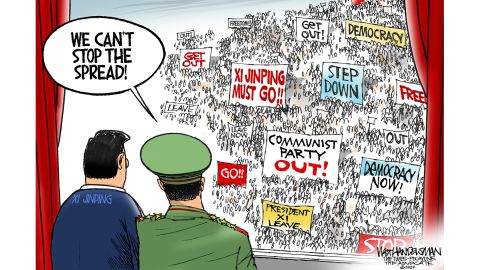
Michelle Blandin’s parents and sister were killed in Riverside, California last month by a 28-year-old former police officer who apparently posed as a teenager to develop a relationship with Blandin’s 15-year-old niece online. As Kara Alaimo noted, Blandin spoke out Wednesday, urging parents to watch out for their children’s safety.
“Parents, please know your child’s online activity, ask questions about what they’re doing and whom they are talking to,” said Blandin. “Anybody can say they’re someone else and you could be in this situation.”
Alaimo observed, “It’s not just parents who should be worried about this problem. We all need to take this incident as the wakeup call it is about just how many of the people we meet online may not be who they claim to be.
“‘Catfishing’ is increasing at an alarming rate, especially on online dating sites. One reason people are ‘catfished’ is for money. Online predators try to form emotional connections with their targets and then ask for cash, claiming it’s so they can travel to visit them, or pay for an operation, for example. Then they disappear…
“But the grisly Riverside killings show that catfishers don’t just prey on people’s finances. They can also put our lives in danger.”
Former President Donald Trump’s announcement of his candidacy for the 2024 GOP nomination was soon overshadowed by another event at his Florida home – Trump’s dinner with the increasingly extreme rapper Kanye West, who has spread antisemitism, and Nick Fuentes, a White nationalist and Holocaust denier.
Trump’s former Middle East envoy, Jason D. Greenblatt, was among many Republicans asked for their reaction to the Mar-a-Lago dinner. “I think it’s a straightforward answer — it should not have happened. Period.” Greenblatt wrote for CNN Opinion, “I hope President Trump condemns Fuentes, West and their ilk for what they are — haters of Jews and haters of the foundations of the United States of America. People like Fuentes are dangerous to the United States. The President Trump that I know would recognize that and issue this condemnation.
“Regardless of how or why the dinner happened, haters such as Fuentes and West should not be given a platform or seat at the table by anyone.”
For more:
Dean Obeidallah: Trump hosting a bigot at Mar-a-Lago’s not surprising. Here’s what is
Schlitz was a popular beer brand that alienated fans when it changed its recipe. Bill Carter sees the company’s story as a cautionary tale for Elon Musk, the world’s richest person who is now attempting to reshape Twitter in his image.
“It got so bad that after droves of consumers had bolted for Budweiser, Miller Lite or Coors,” Carter recalled, that “Schlitz launched an infamous ad campaign in which actors playing Schlitz drinkers – a boxer, a lumberjack with a hungry cougar – threatened to punch you out or have you mauled and eaten for lunch if you dared take away the ‘gusto’ of a mug of Schlitz. These became some of the most memorable commercials in TV history, nicknamed the ‘Drink Schlitz or I’ll Kill You’ campaign.
“This is not a fable. This really happened. A company, once actually the leading brand in its field, came under new management, which made a conscious decision – in pursuit of bigger market share and profits – that amounted to sabotaging its own product. And was rewarded by going out of business.”
Carter added, “Of course, Twitter is not beer, though it can be intoxicating. (Also not safe when driving.)”
“But Twitter does have new management, and a leader who seems to have set a course to radically alter its ingredients; and yes, a significant portion of its loyal consumer base has become disaffected and unhappy.”
For more:
Julian Zelizer: Amazon’s recent film decision reveals a dangerous trend
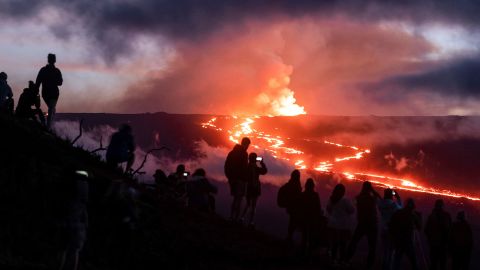
The first eruption of the Mauna Loa volcano in nearly 40 years lit up the nighttime skies on the Big Island of Hawaii.
As volcanologist Einat Lev wrote, scientists had detected signs of increased seismic activity, and nearby communities are prepared, “thanks to Mauna Loa’s little hyper-active sibling, Kilauea, which has been erupting almost continuously.”
“Only four years ago these communities experienced a major disaster when fissures (volcanic cracks) opened low on the eastern flanks of Kilauea, in the middle of a quiet town, and a months-long eruption devastated the area.”
“Luckily, the recent eruption of Mauna Loa is less likely to cause as much damage. The lavas are coming out of fissures at a very high elevation, far from any population or property. So far, the only infrastructure that was damaged was a remote mountain road. If the eruption continues at the current rate, it might cut through a highway that links the east and west sides of the island in about a week. This will disrupt the cross-island traffic, from people going to work to transportation of goods, but hopefully will not cause significant property damage.”
On one level, Merriam-Webster’s designation of “gaslighting” as the word of the year seemed “a little late,” wrote Nicole Hemmer.
“The term became the go-to way of describing former President Donald Trump’s devotion to creating false realities through repeated lies all the way back in 2016. As one of the first people to apply the term to Trump’s rejection of reality (in a viral piece for US News & World Report in March 2016), I’ve paid attention as the word entered the political lexicon and broadened until it became, essentially, a synonym of ‘lying.’”
“But in that broadening, something has been lost,” Hemmer argued. “Gaslighting describes a particular type of psychological abuse, where the abuser repeatedly undermines and contradicts the victim’s perception of the world, to the point where she questions her own experiences and memories. In the play ‘Gas Light,’ the goal was to swindle the woman out of money. But the broader purpose is to make women uncertain and dependent, to render them unreliable narrators of their own experiences — especially experiences of abuse, harassment and assault.”
In a round of interviews, Sam Bankman-Fried has apologized for the collapse of his crypto empire, denying any intention to defraud investors. It’s time to also look at some of the broader lessons of the FTX debacle, wrote Casey Michel, including the company’s decision to move its headquarters to the Bahamas, which proclaimed itself a welcoming destination for crypto companies.
“At long last, questions are also being asked about the relationship between crypto and the broader world of offshore finance itself,” Michel wrote. “It’s a relationship that has seen surprisingly little attention compared to things like real estate, luxury yachts and artwork – thanks in large part to the oligarchs surrounding Russian President Vladimir Putin, and how they’ve used these offshore services to hide their wealth…”
“But crypto, oddly, hasn’t seen nearly as much attention – or as much concern. Maybe it was all of the excitement surrounding the new technology. Maybe it was all of the get-rich-quick promise associated with early crypto entrepreneurs. Maybe it was just the fact that various celebrities endorsed FTX.”
“Whatever it was, investigators and legislators apparently missed the fact that crypto had become as enmeshed in the world of offshore finance as any other industry.”

In pop culture, billionaires and lesser moguls are taking it from all sides. “A remarkable number of titles are carving up what’s been called the Second Gilded Age, in which a tiny number of people have amassed a staggering amount of personal wealth,” wrote Sara Stewart. “Inflation, the pandemic, wage stagnation and soaring corporate profits seem to have created the perfect environment for class satire to thrive.”
Two new films – “The Menu” and “Triangle of Sadness” – “skewer the billionaire class with particular gusto. They’re the latest entries in a hot ‘eat the rich’ trend in entertainment – though more accurately for these titles, it’s ‘the rich eat.’” They follow in the path of “Parasite,” which won the 2020 Oscar’s Best Picture and “The White Lotus,” among others.
Still, Stewart observed, “There’s an undeniable disconnect” between the themes of the films and shows – “that the ultra-rich are ripe for the takedown – and the reality that continues, outside movie theaters, to be one in which the world’s wealth is concentrated in a few sets of hands.”
Billionaires want to give it away – eventually. Or at least many of them do, wrote Chuck Collins. “Amazon founder Jeff Bezos, for instance, recently told CNN that he would be giving away the majority of his $124 billion fortune in his lifetime,” Collins noted. “More than 230 billionaires from 28 countries” have taken the Giving Pledge, an initiative started by Warren Buffett, Melinda French Gates and Bill Gates, promising to donate the bulk of their wealth.
“At this point, we should assume a skeptical posture,” wrote Collins. “The truth is, pledges like these may take years, decades or even generations to reach their nonprofit destinations – if ever. That’s why we need more public scrutiny of billionaire philanthropy – and much clearer rules to make sure donations actually support real, working charities.”
Billionaires may be key to solving the climate crisis, wrote Abigail Disney, daughter of a co-founder of the Disney empire. “According to new Oxfam research, the company investments of just 125 billionaires emit 393 million metric tons of CO2 each year, equivalent to the emissions of France,” Disney wrote.
“Billionaires hold extensive stakes in many of the world’s largest and most powerful corporations, and therefore they hold the power – as individuals – to influence the way companies act. They help shape the future of our economy. And many of them stand by as corporations set and then fail to meet one social responsibility goal after another, primarily because of the drive to deliver value for shareholders and other investors.”
When the new Congress convenes January 3, Hakeem Jeffries will be leading the Democrats in the House, becoming the first Black party leader on Capitol Hill. And if Kevin McCarthy can scrape up enough votes, he will become House Speaker as the leader of the Republicans, who narrowly recaptured the majority in the November election.
“With enough negotiations, concessions and wheeling and dealing,” wrote Patrick T. Brown, “the most likely scenario is that McCarthy will squeak out just enough votes. But the uncertain start to his potential tenure, and the challenges he faces within his own caucus, reflect both the tumult of trying to lead a legislative body in an anti-institutional age and the fundamental uncertainty of what the Republican Party actually stands for.”
On the Democratic side, Jeffries has a smoother path as he assumes control from Nancy Pelosi, who is stepping down from leadership of the party.
“That a Generation X, hip-hop-quoting congressman has become the first Black person to lead a major party, with the potential of ascending to the speaker spot depending on the 2024 elections, is all the more remarkable considering tensions within the Democratic coalition and racial divisions with which America continues to wrestle,” wrote Peniel E. Joseph. But he still faces challenges, given that some on the left “see him as too mainstream for the radical change they feel is necessary to right a ship of state still reeling from voter suppression, racial injustice, economic inequality and legislative efforts that have tried to censor truth teaching in public schools.”
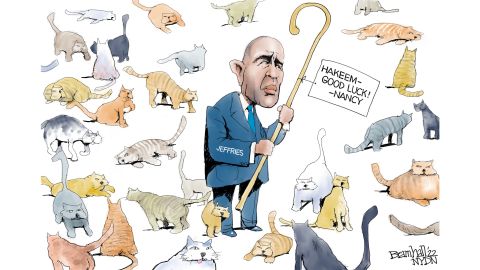
In Tuesday’s Georgia runoff for the US Senate, incumbent Raphael Warnock, a Democrat, faces a hard fought challenge from Republican Herschel Walker. The former football hero has a major handicap in the closing days, according to Frida Ghitis. It’s spelled Trump.
“Trump, who all but anointed Walker as the Republican nominee, is one of the biggest obstacles standing between Walker and the Senate. To win the runoff, Walker needs to convince those who voted for him to do it again, but he also needs to bring in Republicans and independents who dislike Trump.”
“Here’s the dilemma: To fire up enthusiasm among Trumpists so they’ll turn out again, he needs to feed them the political red meat that keeps MAGA energized. But that’s the same menu that can make other voters he needs feel nauseous,” Ghitis observed.
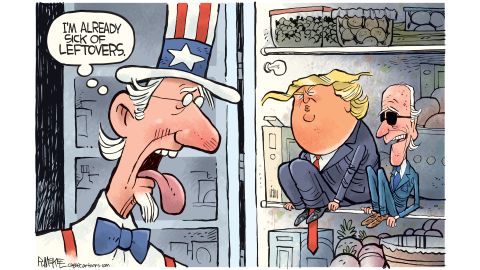
Ukraine has liberated the eastern city of Kherson from the Russians but the victory came at a price. Writing from Kherson, Amed Khan recalled visiting Sasha, a 35-year-old soldier, in a dimly-lit military hospital.
He “was recovering after a mine blew up his pickup while he was traveling to a newly liberated village in the Kherson region,” Khan wrote.
“Russia’s withdrawal from this key southern Ukrainian city earlier this month was a major blow for the Kremlin, but it left residents with ruined infrastructure and the lingering threat of mines, trip wires and unexploded ammunition.”
“Sasha only survived because one of his fellow soldiers navigated their truck out of the minefield, found help, then returned to carry him out. For him and his comrades, that was just another day in their battle for freedom…”
The stakes of the war are high, Khan wrote. “Every day in Ukraine, I am surrounded by modern day versions of the patriots who won American independence. Though they are different struggles, we fought for freedom and self-determination, just like Ukrainians today. They face one of the largest and most extensively resourced armies in the world, just like we did. The righteousness of their cause matches our own from almost 250 years ago.”
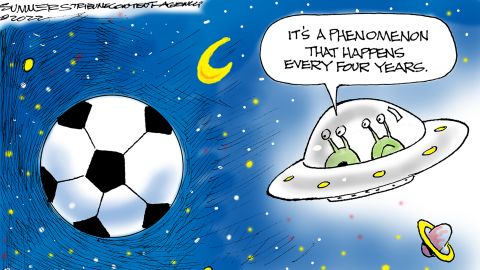
Amy Bass: Why America’s losing team goes home with big wins
Allison Hope: The Senate just gave LGBTQ Americans a reason to breathe easier
Jill Filipovic: What to make of Will Smith’s contrition
Holly Thomas: Hugh Grant is right about ‘Love Actually’
Dr. Megan Ranney: Why the US is having shortages of antibiotics now
Dennis Aftergut: The vital lesson of the Oath Keeper verdict
Vincent Guilamo-Ramos: We have the tools to fight HIV. We just need to use them
Chloë Grande: What I learned from anorexia the second time around
AND…
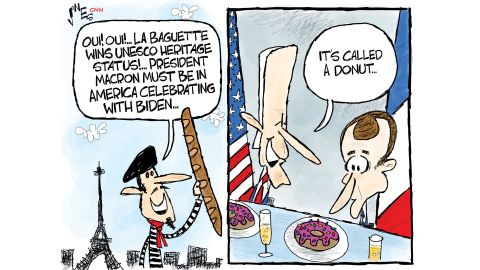
France’s iconic loaf of bread, the baguette, was added to UNESCO’s list of Intangible Cultural Heritage this week, a fact that was celebrated by French President Emmanuel Macron as he visited Washington this week and prepared to attend President Joe Biden’s first state dinner.
“It is not merely the simple common ingredients—flour, water, salt, and yeast—as it is the deep experience and skill that goes into making them that explains the reality,” wrote David A. Andelman, who confessed though that he prefers “the smaller Viennoise au chocolat—a smaller baguette-shaped bread of a slightly softer texture with dark chocolate bits throughout. Indeed, as it happens, Vienna played an important role in the development of the modern baguette. It was Viennese ‘steam ovens,’ imported to Paris in the 19th century that allowed the long, narrow bread with a thin crispy crust to be baked quickly and reliably.”
Source link



